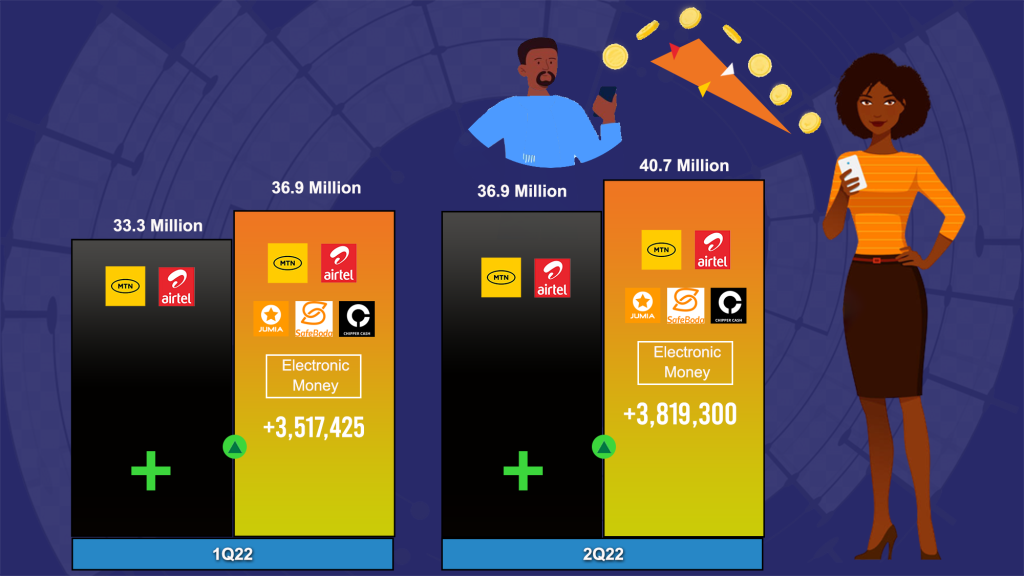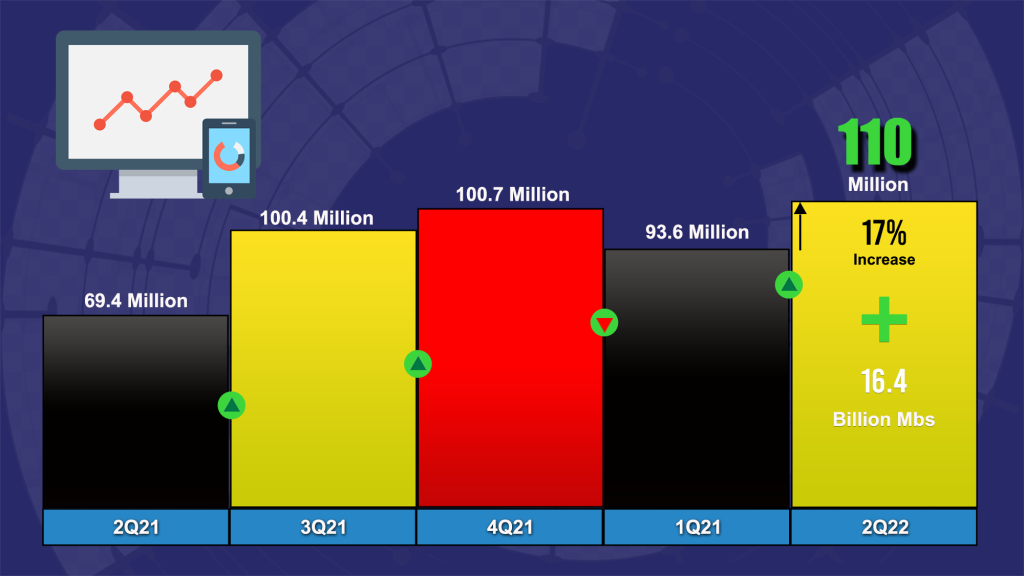
KAMPALA –Two hundred and thirty-two thousand (232,000) new broadband subscriptions were recorded between April-June 2022, bringing total broadband connections in Uganda to 23.7 million, the Uganda Communications Commission (UCC) market performance report indicates.
In a year-on-year comparison, the 12 months ended June 2022 recorded 1.9 million new broadband subscriptions – an 8% year-on- year growth in broadband subscriptions, says the quarterly report. In terms of penetration, the 23.7 million broadband subscriptions translate into a broadband penetration of 55 internet connections for every 100 Ugandans. “The 232,000 new broadband connections are 34% of total new telephone connections.
The growth in new broadband connections may be attributed to new smartphone promotional device activity during the quarter,” the report states. On the other hand, fixed and mobile subscriptions grew by more than 690,000 new subscriptions during the period under review, bringing the total number of subscriptions to 31.3 million at the end of June 2022. The report further indicates that over 12 months (June 2021-June 2022), 2.4 million new telephone subscriptions were recorded – an 8% year-on-year growth, which translates into a national telephone penetration of 73 lines for every 100 Ugandans.

Digital Financial Services
On digital financial services, the report states that 40.7million digital wallets were recorded at the end of June 2022. Of these, 36.9 million were mobile money wallets linked to Mobile Network Operators (MNO) such as MTN, Airtel and UTL, while 3.8 million wallets (10%) were administered by licensed non-MNO Payment Service Providers. The quarter also saw the harmonization of Airtel and MTN mobile money cross network remittance charges. Consequently, the report says, MTN and Airtel have uniform cross network transfer rates with effect from April 2022

Cyber Security
To curb the scourge of mobile money fraud, UCC initiated a campaign dubbed “Tonfera” (Don’t con me) to further raise awareness about cyber security. Through this ongoing campaign, UCC has partnered with Mobile Network Operators, Bank of Uganda, and the National Association of Mobile Money operators to conduct consumer awareness on both traditional and social media platforms. Relatedly, UCC hosted the Second Annual Cyber Security CEO Forum under the theme, “Cybersecurity for Mobile Financial Services in the Telecommunication Sector: A growing Challenge”, during the quarter.
The Forum brought together thought leaders from the technology, banking and Fintechs sectors to discuss emerging cyber security threats in the Digital Financial Services ecosystems.
Taxes on digital services
It was also during this quarter that Uganda moved to implement the collection of VAT from online digital services offered by non-resident digital service providers such as Google, Netflix, Meta, and Spotify. “Affected services may include online advertising, online music and video streaming, supply of software, access to databases, films and games of chance/betting,” the report said. Other African countries that have moved to enforce digital tax on non-resident persons providing digital services to residents include South Africa, Nigeria, and Kenya, according to the report.
Mobile Devices
Turning to devices, the report states that networks connected more than 1 million new gadgets in the three months ending June 2022. This growth brought the total number of connected devices to 36.1 million, up from 35 million at the end of March 2022. Considering a year-on-year comparison, connected devices have grown by 4 million between June 2021 and June 2022 – a 12% growth rate. Consistent with earlier device trends, 40% of all new terminals were smart gadgets while feature and basic phones accounted for 60% of all network connected devices. As of June 2022, the total number of internet-enabled gadgets connected to the networks stood at 10.9 million compared to 25 million feature phones and basic phones.

International meetings
On the global ICT policy front, the highlight of the quarter was the 8th World Telecommunication Development Conference (WTDC) held in Kigali, Rwanda, in June 2022.
This was the first time for this major ICT policy conference to be held in the global South. WTDC 2022 attracted more than 2,100 participants from 150 ITU member states and 340 sector members, bringing together national ICT policy makers, regulators, academia, think tanks, manufacturers, and other ICT ecosystem actors.
The 10-day forum adopted the Kigali Action Plan, which principally agreed to align Global ICT digital development goals with the UN’s SDGs for the year 2030. Furthermore, member states and partners made national ICT policy and financial commitments worth USD 25bn to bridge digital gaps in affected communities.

Another global highlight of the quarter was the Fortieth Meeting of the International Telecommunication Satellite Organisation (ITSO) Assembly of Parties (AP-40) held in Washington DC, USA, between June 28-30, 2022. During the meeting, Uganda was re-elected to the ITSO Advisory Committee while former UCC Executive Director Patrick Masambu was re-elected for a second term as Director General of the organisation.

Mr. Patrick Masambu, Director General, ITSO
ITSO is an intergovernmental organization established in 1973 in response to the UN General Assembly Resolution 1721 (XVI) that sought to make satellite Communication technology available to all countries of the world on a non-discriminatory basis.
Broadband traffic
On broadband traffic, the report indicates that the 110 billion MBs of internet traffic recorded in the quarter was the highest volume of internet traffic ever recorded in a quarter. This represented a 17% increase from the 93.62 billion MBs recorded at the end of the first quarter (March 2022).
“This growth is largely indicative of increased broadband usage rather than an increase in broadband subscriptions. In percentage terms, the growth in internet traffic is 17 times the growth in broadband subscriptions realised during the quarter,” the report explains. The growth in internet usage, the report observes, is consistent with the trend of data-led consumption becoming more popular than traditional voice traffic, as well as the growth in streaming services.

Postal and Courier
On the postal and courier sub-sector, the report mentions the Annual Pan Africa Postal Union (PAPU) ordinary session for the Administrative Council, which brought together Africa’s postal policy makers, regulators, operators, and service providers in Kinshasa, Democratic Republic of Congo.
The PAPU Administrative Council [in which Uganda chairs the Strategy Committee] discussed strategies on how the post can be leveraged to support Africa’s attainment of the UN Sustainable Development Goals (SDGs).
Back home, domestic mail volume deliveries during the period ending June 2022 were distributed across different post and courier operators as follows: Speedaf- 28%, SGA (Big Orange)- 20%, DHL- 19%, UPL- 16%, and Hesed Holdings- 9%. Others collectively contributed 7%. Meanwhile, the volume of mail Uganda received from other countries grew to 48,740, up from 47,586 in the quarter ending March 2022. This represents a 2% quarter-on-quarter growth.

Out bound Mail volumes
In a year-on-year comparison, the post and courier market grew by about 10,000 mail deliveries, translating into a 25% annual growth. Out bound mail volumes also grew to 37,014 mails during the quarter ending June 2022, up from 36,431 in March 2022. This translated into a 2% quarter-on-quarter growth. Although inbound mail volumes continue to dwarf outbound mail volumes, the growth rate remained the same in both aspects during the quarter under review.

Inbound Mail volume
Another key highlight of the quarter, the report says, was the 9th edition of the Uganda Film Festival (UFF).
The annual event that ended with an awards gala at the Uganda Institute of Information and Communications Technology (UICT) in Nakawa, saw winners from 23 film categories walk away with generous awards. On the broadcasting side, the reported highlighted an increase in the total active pay TV subscribers from 1.45 million as of March 2022 to 2.2 million in June 2022.
Read full report:

















